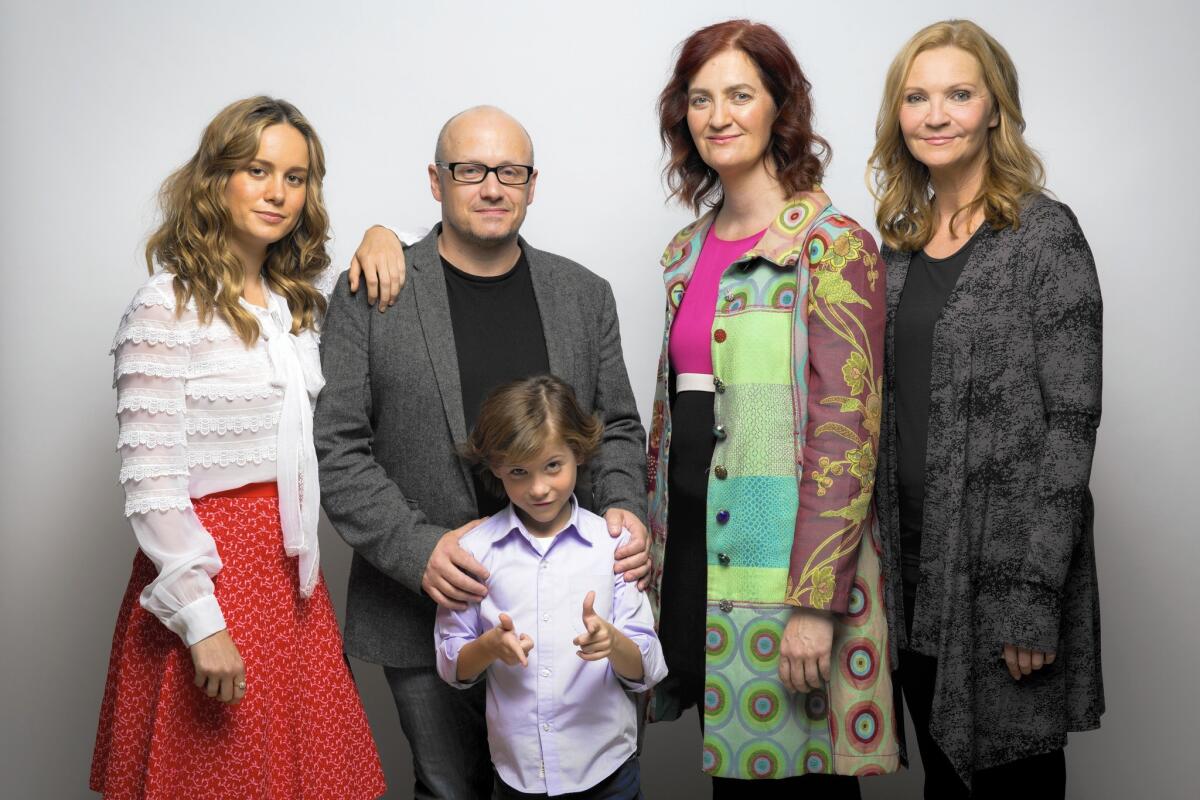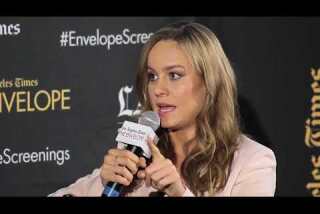Oscars 2016: The great spoiler -- three major nominees stepped aside to make ‘Room’ for this one

There were surprises in at least three major Oscar categories when voters announced their nominations Thursday morning. Best picture saw “Carol” omitted. Adapted screenplay was missing a certain “Steve Jobs” screenwriter. And the director field yielded no trace of “The Martian.”
On its face, these three movies — a period lesbian drama, a Silicon Valley origin story and a science-fiction survival tale — wouldn’t seem to have much in common.
But they were united by an improbable thread: In each case, the long-shot independent film “Room” took a spot that might otherwise have gone to them.
Oscars 2016: Full Coverage | Complete list | Snubs, surprises and reactions | Top nominee photos | Oscars are so white, again
Call it the Great Spoiler. “Room,” an intimate drama about a young woman (Brie Larson) and her son (Jacob Tremblay) held captive in a shack, has managed to crash the party of multiple bigger, gaudier contenders. While it’s impossible, from the academy’s alphabetized list, to infer which movies were first in or last out, pundits had suggested all three of the snubbed would in fact be nominated. “Room?” It was a bubble candidate. And that was in the best of categories..
That’s certainly true in both best picture and adapted screenplay categories, the latter of which had screenwriter Emma Donoghue nominated for her script based on her novel -- and powerhouse screenwriter Aaron Sorkin not included for his script based on Walter Isaacson’s bestselling Jobs book.
But it’s particularly true in the director category, where “The Martian” helmer Ridley Scott was considered a lock — a front-runner, really — while the name of “Room” filmmaker Lenny Abrahamson could be heard on few prognosticators’ lips.
So inaudible was that name, in fact, that after the nomination even Abrahamson wasn’t sure it happened.
Watch Q&As with ‘Room’s’ Brie Larson


'Room:' When Brie Larson read the novel for the first time

'Room:' Tapping into dark moments with Lenny Abrahamson

'Room:' Breaking down the film's reunion scene

'Room:' Learning from real life victims

'Room:' How everything in the film tells a story
“This came out of the blue, “the director said by phone from Dublin on Thursday, sounding dazed about the news. “The common wisdom is that these nominations for director are sometimes a bit of a lifetime achievement award. Or they’re about the flash.” He paused. “I don’t think I’d fit into either of those.”
“Room” is indeed a step up into higher-profile filmmaking for the Irish native Abrahamson, 49, whose previous best-known work was the cultish “Frank” about an eccentric rock star with a compulsion for a papier-mâché mask. And the direction in “Room” is far from flashy; part of the point, in fact, is to drop viewers in to the shed with a minimum of distracting auteur flourishes.
“Room” was basking in other accolades on Thursday. The film — financed by the British company Film4 and the boutique U.S. distributor A24, which also released it in the U.S. — was one of just two films to score nominations in the so-called power four quarter of picture, director, screenplay and lead actor. (Larson was nominated for actress, an expected turn; she is considered a favorite to win.)
How a movie that has grossed barely $5 million at the U.S. box office and was dismissed by many pundits as too small or too difficult to be a broad Oscar contender came to be such a powerhouse is one of the season’s intriguing narratives, the little-engine tala that comes along only onceevery few years, Among other things, the campaign has had to contend with the perception that a story featuring rape and torture was still worth popping into the DVD player--and persuade enough voters they should do so despite their reservations.
The project has a modest back story. Donoghue had advocated for Abrahamson and his longtime friend and producing partner, Ed Guiney, fellow Irishpeople who would form a tightknit creative group with little outside interference indeed the idea of a novelist adapting his or her own work is a rarity) before shooting the film in Toronto a little more than a year ago.
“I really think this is a template for how to make a movie without a lot of big money,” Donoghue said Thursday, “but with a focus on protecting the story, protecting the process.”
A24--founded by the former Adam Yauch partner David Fenkel,the Guggenheim Partners principal Daniel Katz and the Big Beach veteran John Hodges--has been in existence only about three years. The decision to come aboard “Room” before it went into production is a departure for the firm, which before this had mostly acquired finished films.
In the past the company has also not been a significant player in awards season, though it has been involved in a number of acclaimed dramas, including J.C. Chandor’s “A Most Violent Year” in 2014. On Thursday it also garnered nominations for its 2015 releases “Ex Machina” and “Amy.” Fenkel declined to comment via a representative, who said executives wished to keep the emphasis on the films for the moment.
For their part, those who worked on “Room” said they believe the lesson of Thursday was that a powerful and universal theme could win out, no matter what packaging it comes in.
“I think this is a hard movie for people to watch, but when they do they are moved by it,” Donoghue said when asked what she thought it’s caught on. “It comes in the tradition of romantic love that’s tested, except in this case that romantic love is the love between a parent and a child. And everyone has either been a child or has a child in their lives.”
More to Read
From the Oscars to the Emmys.
Get the Envelope newsletter for exclusive awards season coverage, behind-the-scenes stories from the Envelope podcast and columnist Glenn Whipp’s must-read analysis.
You may occasionally receive promotional content from the Los Angeles Times.






